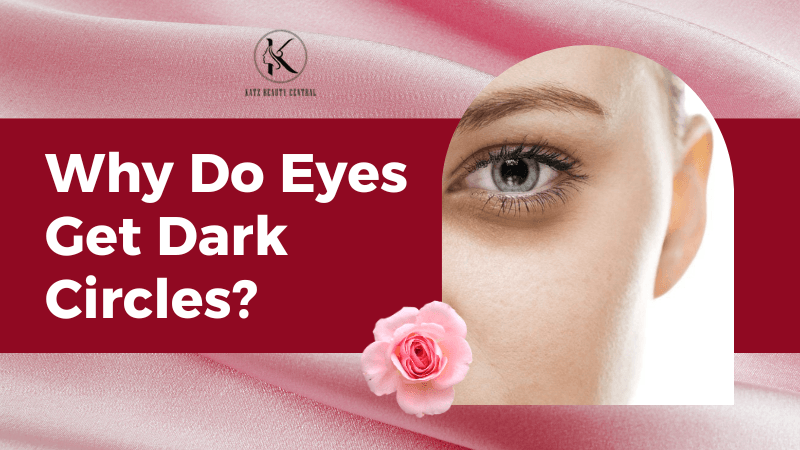
Why Do Eyes Get Dark Circles? Causes, Effective Treatments and Prevention Measures
Share
Dark circles under the eyes, also known as dark circles under the eyes, are a common problem that almost everyone has experienced at least once in their life. Although not a sign of a serious illness, dark circles under the eyes can greatly affect the appearance and psychology of the sufferer. Many people feel self-conscious, tired and worried when their eyes become puffy and dark, because this can easily cause a feeling of lack of vitality. So, why do eyes get dark? What are the causes and is there any way to treat and prevent this condition effectively? In this article, we will learn in detail about the causes of dark circles under the eyes, as well as measures to help overcome and prevent this phenomenon scientifically and safely.
1. Introduction to dark circles under the eyes
Dark circles under the eyes are a fairly common phenomenon, not only affecting appearance but also being a sign of some health problems. This is a condition in which the skin around the eyes becomes dark, making the person with dark circles under the eyes look tired and lifeless. Although dark circles under the eyes are not a serious disease, if not treated promptly, they can cause inconveniences in daily life, from loss of confidence to health concerns.
Dark circles under the eyes can appear at any age and affect both men and women. This is a problem that many people encounter, especially those who have the habit of staying up late, working under stress or having health problems. However, the causes of dark circles are very diverse and not always easy to recognize.
2. Causes of dark circles
2.1. Genetic causes
One of the main causes of dark circles is genetic factors. If someone in your family has had dark circles, it is likely that you will also be affected. The skin around the eyes of people with thin and weak skin is more prone to dark circles. People with light skin are more prone to dark circles because the skin is thin and the blood vessels under the skin are easily visible.
2.2. Lack of sleep and stress
Sleep plays an important role in overall health, and the skin around the eyes is very sensitive to lack of sleep. When you do not get enough sleep, the body will produce more stress hormones, leading to increased inflammation and making the skin around the eyes prone to swelling and dark circles. Stress also dilates blood vessels under the skin, causing dark circles.
2.3. Unhealthy lifestyle

An unhealthy diet, excessive consumption of fast food, alcohol, or tobacco can reduce skin health, making the skin dry and prone to dark circles. In addition, lack of water is also a factor that makes the skin around the eyes vulnerable and prone to dark circles.
2.4. Hormonal changes
Hormonal changes in the body, especially during pregnancy, menstruation or premenopause, can increase the level of dark circles. Unstable hormones can cause dilation of blood vessels under the skin, creating conditions for dark circles to form.
2.5. Allergies and inflammation of the skin around the eyes
Allergies caused by pollen, dirt, cosmetics or unsuitable skin care products can cause inflamation and swelling around the eyes. The skin around the eyes when inflamed will become dark and prone to dark circles.
2.6. Bad habits and lack of skin protection
Many people have the habit of rubbing their eyes or using skin care products incorrectly, causing the skin around the eyes to be damaged and prone to dark circles. Not protecting the skin around the eyes from the effects of sunlight or polluted environments is also the cause of dark circles.
2.7. Potential health problems
In some cases, dark circles can be a sign of more serious health problems, such as liver, kidney, or blood problems. If the dark circles persist and show no signs of improvement, you should see a doctor for timely diagnosis and treatment.
3. Impact of dark circles on appearance and psychology

Dark circles not only affect appearance but can also reduce the confidence of the sufferer. People with dark circles are often seen as sleep deprived, tired, or even unhealthy. In some cases, dark circles can cause others to misjudge your health.
Psychology is also affected by dark circles, especially for those whose jobs require direct communication or participation in meetings. Dark circles can make you feel unconfident, afraid to communicate, and even lead to anxiety and depression.
4. Effective ways to treat dark circles under the eyes
4.1. Natural remedies to reduce dark circles under the eyes
Natural remedies are simple and easy to do at home to reduce dark circles under the eyes. Some popular methods include:
- Cold compress: Using a cold cloth or ice pack to compress the eyes helps reduce swelling and dark circles quickly.
- Use tea bags: Place cooled green or black tea bags on the eyes for about 10-15 minutes. The antioxidants in the tea will help soothe the skin and reduce dark circles.
- Turmeric and honey: Turmeric has anti-inflammatory properties, helping to brighten the skin, while honey helps moisturize and soften the skin around the eyes.
4.2. Use specialized skin care products
Currently, there are many specialized skin care products on the market that effectively treat dark circles under the eyes. Some products from famous brands can help improve dark circles, such as eye creams, serums containing vitamin C, vitamin K, retinol, or vegetable oils such as coconut oil, olive oil. These products have the effect of brightening the skin around the eyes, increasing elasticity and preventing the appearance of dark circles.
4.3. Cosmetic treatments
If dark circles persist and cannot be improved by natural methods or skin care products, you can consider cosmetic treatments such as laser, filler injections or cosmetic surgery. These treatments help regenerate the skin, fill in sunken areas and effectively reduce dark circles.
5. Preventing dark circles
5.1. Healthy diet
Eating a nutritious diet, adding lots of green vegetables, fresh fruits and drinking enough water helps maintain healthy skin and minimize dark circles.
5.2. Get adequate rest and reduce stress
Try to get 7-8 hours of sleep each night and reduce stress to help the skin around your eyes stay healthy and reduce dark circles.
5.3. Protect your skin from environmental impacts
Use sunscreen to protect your skin from the harmful effects of UV rays and environmental pollution. In addition, you should also avoid rubbing your eyes to avoid damaging the skin around your eyes.
5.4. Practice good eye habits
Do not look at the screen for too long, rest your eyes after every working hour, and do eye relaxation exercises to help maintain the health of your eyes.
Dark eyes are a common problem but can be easily treated and prevented if you understand the cause and have the right care. Through natural remedies, specialized skin care products, and cosmetic treatments, you can quickly improve the condition of dark eyes. Don't forget to maintain a scientific diet, get enough sleep and protect your eye skin to prevent dark circles in the future.
-----------------------------
Katz Beauty Central
Email: katzbeautycentral@gmail.com
Facebook: Katz Beauty
Instagram: Katz Central
Youtube: Katz Beauty Central
Pinterest: Katz Beauty Central
